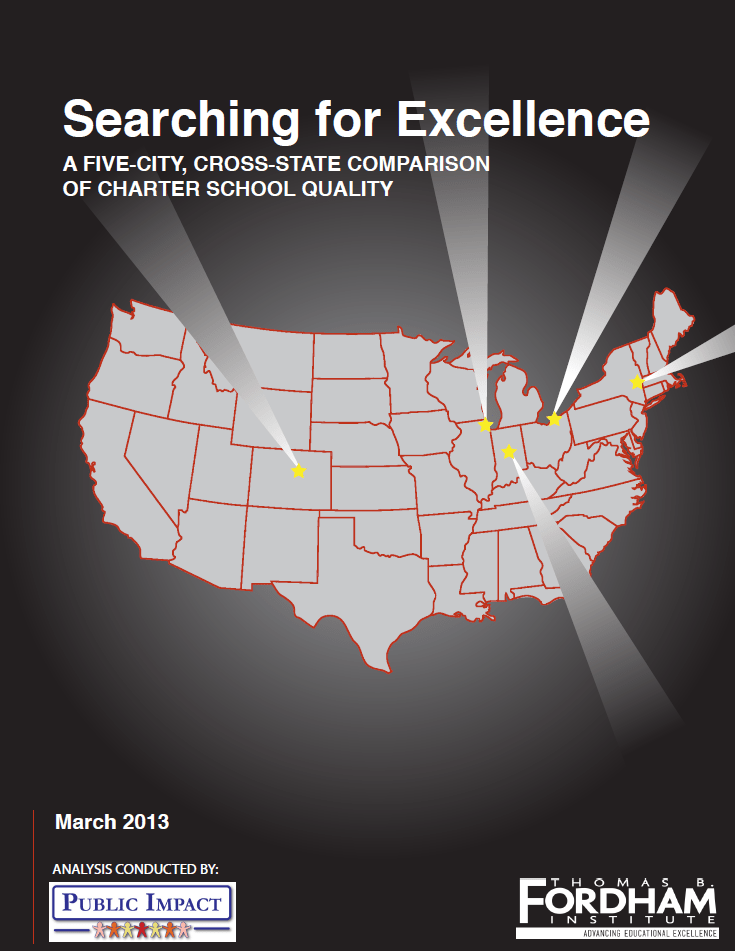Charter schools are booming. From zero charter laws and zero schools two decades ago, there are now more than two million students enrolled in 5,600 charter schools in more than forty states plus the District of Columbia. In seven cities (New Orleans; Detroit; Washington, DC; Kansas City; Flint; Gary; and St. Louis), at least 30 percent of public school students are enrolled in charter schools; in another eighteen cities, including five in our home state of Ohio, charters serve at least 20 percent of the public school–attending kids. It is safe to say that charters are no longer a boutique reform.
 |
But for all of the progress on charter quantity, there’s been disappointingly little progress on charter quality. While there are hundreds of high-performing charter schools across the country serving some of the nation’s neediest students, there are an equal number of charters failing to deliver. It was in recognition of this mixed performance that the National Association of Charter School Authorizers (NACSA) launched its One Million Lives campaign in late 2012. (Fordham, a charter authorizer in the Buckeye State, is a proud NACSA member.)
In order to better understand charter school performance and how to improve it, we asked the crack research team at Public Impact to take a fresh look at the performance of charter schools in five U.S. cities—Albany, Chicago, Cleveland, Denver, and Indianapolis—chosen because they all have relatively large percentages of students enrolled in charter schools and are well known for their recent school-reform efforts. (We have a particular interest in Cleveland.)
Using building-level achievement data, we asked Public Impact to answer some basic questions.
First, how do charter school students in these five cities compare academically to their local district school–attending peers?
Second, how are charters in these cities doing in comparison to district schools across their states?
Third, and most interestingly, what might be the impact on student achievement in these cities’ charter schools if the lowest-performing 10 percent were closed while the top performers were given support to expand their market share by an equal percentage?
In Searching for Excellence, we found that charter schools in our five cities outperformed their home districts’ schools, which had similar levels of student poverty. However, charters in all five cities trailed their states overall—often by a wide margin. (The states, of course, have much lower levels of student poverty.)
Moreover, within each city, quality varied widely, with very high-performing charter schools and dismal ones.
The good news? The study’s simulation clearly points the way to improving the quality of charter schools overall:
- Close or replace low-performing schools and
- Expand or replicate high-performing schools.
(We already know that trying to turn around bad charters—like bad district schools—is usually a fool’s errand.)
If the bottom 10 percent of schools were closed in Cleveland, for example, while the top performers expanded by an equal percentage, within five years the city could have charter schools substantially outperforming the Cleveland Metropolitan School District and on par with Ohio’s statewide results.
In some cities, authorizers and charter supporters have begun building the systems needed to replace failing schools and replicate great ones. In Indianapolis, for example, authorizers including the mayor’s office and the statewide Indiana Charter Schools Board have prioritized scaling up schools that have been successful in Indianapolis and elsewhere, aided by funding from The Mind Trust’s Charter School Incubator. In Cleveland, the newly constituted Cleveland Transformation Alliance is looking into ways to improve charter quality by putting pressure on the laggards, while also adding new high quality schools.
This report makes clear why all authorizers should follow their lead.

